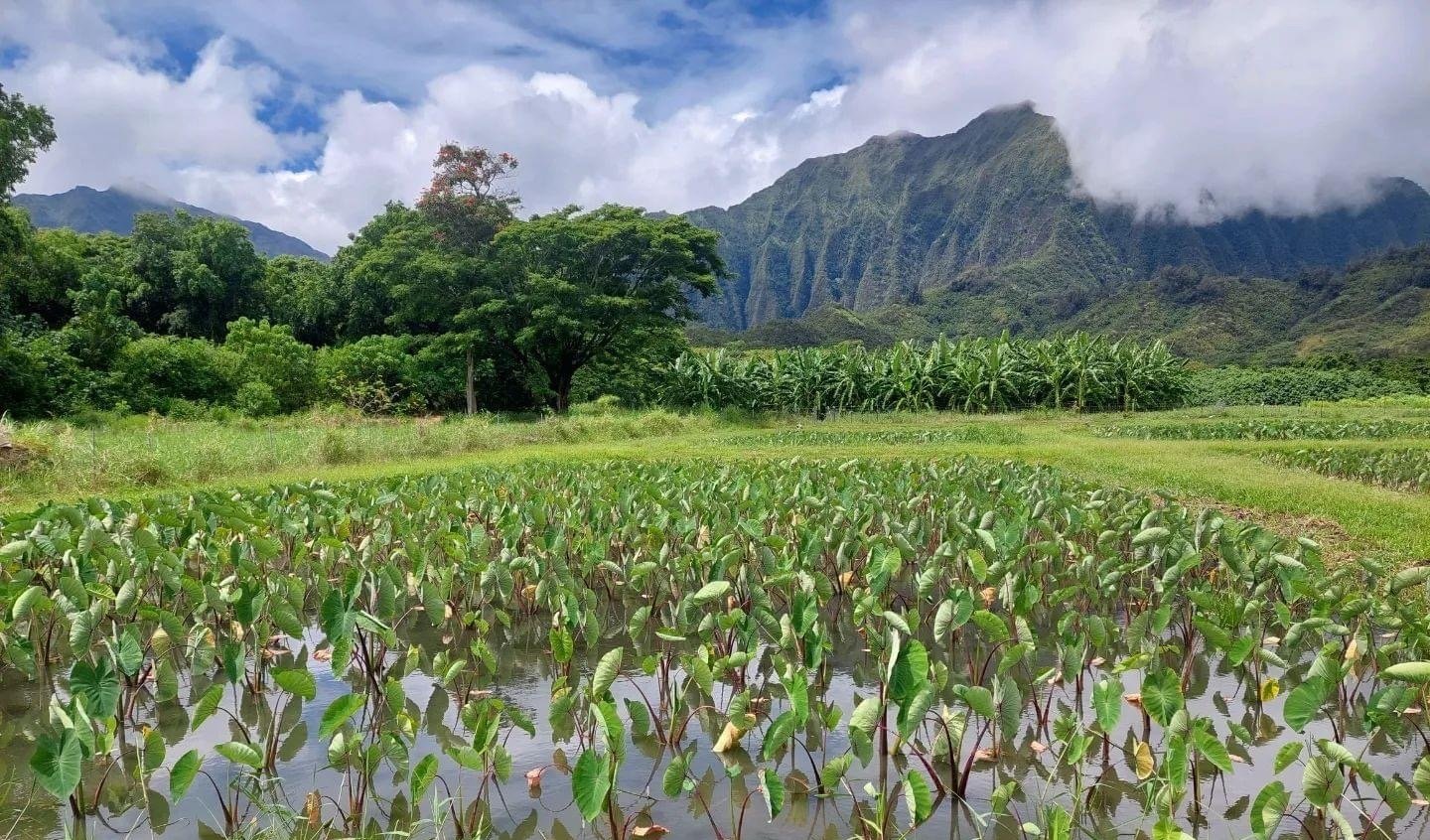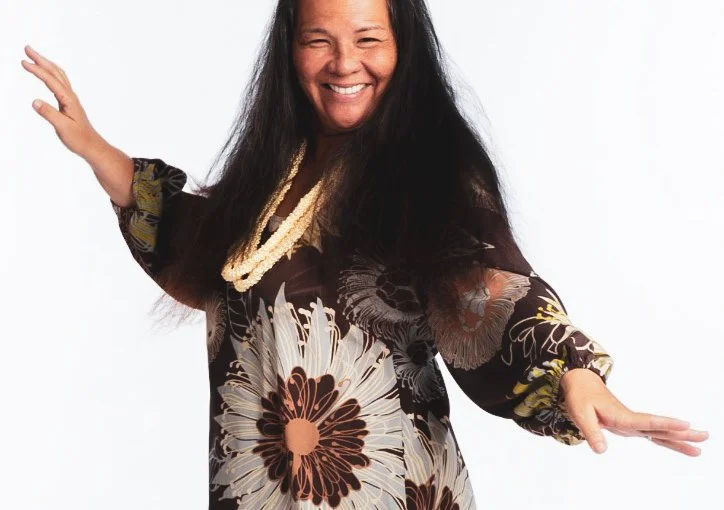
Waimānalo Pono Research Hui
The Waimānalo Pono Research Hui is a community–academic partnership that uses indigenous methodologies and principles of community‐based participatory research as the foundation to engage Native Hawaiian community members in research. A part of their mission is to ensure all projects that work with the Waimānalo Pono Research Hui are ethically sound and grounded in the community's preferences, cultural knowledge, and lived experiences. Ke Ola O Ka ʻĀina went through a community vetting process called the Waimānalo Pono Research Hui Shark Tank, where community members voted to support the project.
Mahalo to the aloha ʻāina warriors across the pae ʻāina who contributed to Ke Ola O Ka ʻĀina, from Ho‘okena, Hawai‘i Island, O‘ahu Island, Maui Island, and Kaua‘i Island.
Mapuana C. K. Antonio, DrPH
Dr. Mapuana Antonio is a Native Hawaiian Assistant Professor, with a joint position in Native Hawaiian and Indigenous Health at the Office of Public Health Studies and in Human Nutrition at the Department of Human Nutrition, Food and Animal Sciences. Dr. Mapuana works and conducts research with Native Hawaiian communities, applying the principles of community-based participatory research. Her research takes a holistic approach to health and has primarily focused on general health and resiliency of Native Hawaiians and determinants of health of Native Hawaiians and Indigenous Peoples. Dr. Mapuana is the Principal Investigator (PI) of the Ola HAWAII pilot study Ke ola o ka 'āina. The role of 'āina (land) connectedness in Native Hawaiian health and has served as a co-Investigator for the Papakōlea Hawaiian Homestead Community Health Survey and the Indigenizing the Curriculum: Case Example from the Puni Ke Ola Project. In the past, she has served as a research assistant for 1) PILI (Partnership for Improving Lifestyle Intervention) ‘Ohana Program, an NIH-funded project and a community-based participatory research project that aimed to address obesity and related disparities in Hawai‘i and the larger Pacific, 2) Project PONO (Promoting Optimal Native Outcomes) a community-based participatory project that aimed to better understand maternal stress and coping strategies among women from a rural community in Hawai‘i, and 3) HCCI, a strengths-based and youth led program that aimed to prevent youth suicide and increase early intervention by positively impacting at-risk communities in Hawai‘i. She also has gained international research experience as a scholar in the Māhina International Indigenous Health Research Training.
Aunty Ilima Ho-Lastimosa, MSW, MOA
A strong proponent of food sovereignty and sustainability, ʻIlima is passionate about giving Pacific Island communities the tools, knowledge and skills they need to grow food in their backyards. To that end, Ilima became a certified Master Gardener and an aquaponics expert, with which she has spent the last six years teaching aquaponics throughout the Pacific and Pacific Northwest. She received her BA in Hawaiian Studies and MSW from the University of Hawaiʻi. Presently employed as the Community Coordinator for the Waimānalo Research Station, Ilima works with numerous school-aged children through partnerships with nearby schools. As the founder of God’s Country Waimānalo, Ilima has & continues to offer programs to the Waimānalo and Native Hawaiian Communities.
Samantha Keaulana-Scott, PhD
Samantha is a PhD candidate in University of Hawai’i at Mānoa Public Health program. She received her Master of Social Work degree from the Myron B. Thompson School of Social Work at the University of Hawaiʻi at Manoa. Samantha has experience in facilitating and implementing community-based participatory research projects within predominantly Native Hawaiian communities, including the PILI (Partnerships to Improve Lifestyle Interventions) ‘Ohana Project and the KaHOLO Study. She has worked closely with God’s Country Waimānalo and Ke Kula Nui O Waimānalo, non-profit organizations that have initiated culturally grounded projects focused on wholistic wellness, self-sufficiency, and food sovereignty for Native Hawaiians. As a strong proponent for decolonizing methodologies, Samantha has been a part of the Waimānalo Pono Reserach Hui (a community and academic partnership that serves as a space for the community to self-determine priorities of interest in research and other initiatives) since itʻs conception in 2017. Samantha has a strong interest in wāhine (Native Hawaiian women) health, and historical and intergenerational trauma. She understands her role as a budding researcher as her kuleana (responsibility) to serve her Lāhui (Hawaiian Nation) in perpetuity.
LeShay Keli‘iholokai
Born and raised in Waimānalo, Oʻahu, LeShay received her Bachelors of Science in Pre-Medical Studies from Hawaiʻi Pacific University. Over the course of eight years, LeShay was part of the Hui Mālama O Ke Kai Foundation, where she created the ʻŌpio Leadership Program. This program was developed to instill servant-hood leadership within the ʻōpio of Waimānalo. LeShay went on to pursue a Master of Arts degree in Art Therapy and Counseling from Southwestern College in Santa Fe, New Mexico. She believes that through art we are able to explore emotional, behavioral, and social challenges to better understand the human psyche, allowing access to one’s core self.
Kenneth Ho Jr.
Born, raised, and residing in Waimānalo, Kenneth Ho, Jr. is a father to two elementary-aged daughters. Having retired from careers as a firefighter and military officer, Kenneth keeps his national certification and state license in emergency medical technician (EMT) valid. He serves as a board member for several nonprofits and public charter in his community. Kenneth graduated from the Kamehameha Schools, received his BS in Occupational Education from Wayland Baptist University and completed the MS in Operations Management at the University of Arkansas. With a passion and drive for education, including educating his own children as well as other community members, Kenneth is a graduate of the Doctorate of Education program at the University of Southern California. When time is available, Kenneth uses his EMT certification and license to assist Kiaʻi at Mauna Kea and other organizations.
J. Kahaulahilahi Vegas, MPH
Kaitlynn Felipe, MSW
Kuaiwi Laka Makua, MPH
Māhealani Taitague-Laforga, BPH
Shaylene Moepono-Techur, BPH
Kira Rapozo, MSW
Amilaina Leota, BPH
Tyrelle Unciano, BPH
REsearch mentor team:
Jane Chung-Do, DrPH
J. Keawe’aimoku Kaholokula, PhD
Earl Hishinuma, PhD
The project, Ke ola o ka ʻĀina. The role of ʻĀina connectedness in Kānaka health, was supported in part by grant number U54MD007601 from the National Institute on Minority Health and Health Disparities (NIMHD), a component of the National Institutes of Health (NIH) and U54GM138062 (Center for Pacific Innovations, Knowledge, and Opportunities [PIKO]) funded by the National Institute of General Medical Sciences of the National Institutes of Health. PIKO is a member of the IDEA-CTR Network.
in collaboration with Ke Ola O Ka ‘Āina (Listed in Chronological Order)
Samantha Keaulana Scott (2019-2020)
Title: Every pebble has its place: Perspectives of Waimānalo Limu Hui members on ʻāina and health
Funded By: Kulana Biocultural Initiative Award
Kira Rapozo (Spring 2020)
Title: Ho‘i ka po ‘ai i ka piko: Returning to Kānaka Ō‘iwi Practices to Promote Health and Wellbeing
Funded By: Undergraduate Research Opportunities Program
Amilaina Leota (Summer 2020)
Title: An Exploration of ‘Āina Connectedness in Hawai‘i
Brigham Young University–Hawai‘i Undergraduate Internship
Tyrelle Unciano (Summer-Fall 2020)
Title: Our ‘Āina, Our Kuleana
Funded By: Native Hawaiian Student Services Undergraduate Research Fellowship
University of Hawai‘i at Mānoa Applied Learning Experience (APLE)









